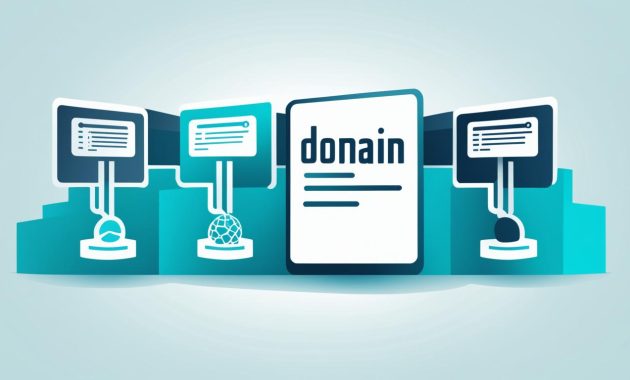People often ask me about domain names and web hosting’s core differences. It’s a question that causes confusion for many. But rest assured, I’m here to make things clear about this key part of establishing your online corner.

Ever felt like your website is lost in the vast web, only visible to those who know its specific URL? Or noticed it’s painfully slow, bothering your visitors? This happens because of how your domain name and web hosting mesh together.
So, what sets these essential parts apart? I’ll explain. Your domain name is your website’s digital address. It’s the unique name before “.com” or “.org”, like “google.com” or “mywebsite.net”. Visitors use it to reach your site.
Web hosting, though, is the service that provides home to your website. It stores your website’s files and data. This is how your site is always available for visitors.
In summary, the domain name is your address, and web hosting is your website’s home. Both are vital for a successful and working site.
But, how do these key parts work together to make your online dream real? Discover in the article ahead. Learn how to create a website that stands out.
Understanding Domain Names
Understanding domain names is key to a successful website. A domain name is like your website’s address on the internet. It helps others find and access your website easily. You’ll learn about the parts of a domain name and the types of top-level domains (TLDs) available in this section.
What is a Domain Name?
A domain name is your website’s unique internet address. It’s made of a name and an extension, like “google.com.” This name makes it easy for users to find your site without needing to remember a long numerical IP address. The domain name system (DNS) acts like a bridge, turning the domain name into the IP address your site uses. This way, users can navigate to your website effortlessly.
Components of a Domain Name
A domain name has two main parts: the second-level domain and the top-level domain (TLD). The second-level domain is what you pick for your site’s name. The top-level domain is the ending, like “.com,” “.org,” or “.net.” Both parts come together to make a unique and easy-to-remember address for your website.
Types of Top-Level Domains (TLDs)
The top-level domain (TLD) is the last part of a domain name. There are many types you can pick from. Some common ones include:
- Generic Top-Level Domains (gTLDs): familiar TLDs that include “.com,” “.org,” and “.net.”
- Country-Code Top-Level Domains (ccTLDs): these TLDs point to specific countries or regions, like “.us” for the United States or “.uk” for the United Kingdom.
- Sponsored Top-Level Domains (sTLDs): used by specific groups, like “.edu” for schools or “.gov” for government sites.
Knowing these TLD types can guide you in choosing a fitting extension for your website’s theme and goals.
The Process of Domain Registration
To register a domain name for your website, you first need to choose a name. This process involves picking a unique name for your spot on the web. Initially, you must renew annually, but you can pay ahead for up to ten years.
Checking Domain Availability
The first step is finding if your chosen domain name is free. Many online tools and domain registrar websites can help. They allow you to see if your preferred name is available or taken.
Choosing a Domain Registrar
After making sure your domain name is free, the next step is selecting a registrar. Registrars help you with the registration process. Companies like GoDaddy, Namecheap, and Hostinger are well-known for this.
Completing Domain Registration
With a registrar chosen, you move on to the actual registration. You’ll need to share your info and select how long you want to keep the domain. This can be annually or up to ten years.
Web Hosting Explained
Web hosting is a key service on the internet. It lets you place your web app or site online. You rent a spot on a server for your data. This allows your site to work well on phones, tablets, and computers.
What is Web Hosting?
Web hosting makes your site visible on the internet. You rent space from a hosting service. They look after the technical stuff, keeping your site live and running smoothly.
Importance of Web Hosting
Good web hosting is vital. It makes sure your site is available online. It also helps your site load fast, stay secure, and handle more visitors as you grow. It’s key to any successful online project, big or small, web hosting explained or what is web hosting.
Factors to Consider When Choosing a Web Host
When you’re picking a web hosting plan, think about certain factors. These can affect your website’s success and dependability. You should check the provider’s ease of use, speed and reliability, pricing, and customer service.
Consider how easy the platform is to use. Find a service with a dashboard that makes it simple to manage your site and emails. It should be easy and clear, not confusing.
Speed and uptime matter a lot too. A good host makes sure your site is always up and loads fast. Look for providers with a strong history of reliability and uptime guarantees.
Prices and what you get with them are also key. You’ll find various options, from basic hosting to more powerful plans. Make sure to pick what’s right for you after looking at what each plan offers.
Good customer support is crucial. You might need help anytime. Hosting with great support options – like live chat or email – is a safer bet, so you can get help fast when there’s a problem.
Types of Web Hosting
Web hosting comes in many types, fitting the needs of all website owners. Hostinger provides various plans for different uses, from personal blogs to big eCommerce sites. Let’s look at the hosting types and what makes them unique:
Shared Hosting
Shared hosting is great for small businesses and personal sites. Here, multiple sites share one server. It costs between $3 to $15 monthly. It’s a good choice for those on a budget or starting out.
VPS Hosting
VPS hosting sits between shared and dedicated services. It gives you dedicated resources on a shared server. More control and flexibility come at a cost between $20 to $100 a month.
Cloud Hosting
Cloud hosting uses multiple servers to handle websites. It’s reliable and can scale up. Prices range from $5 to $300 a month.
Managed WordPress Hosting
Managed WordPress hosting is perfect for WordPress websites. It makes managing and optimizing your site easy. It takes care of technical stuff, so you can focus on your site.
Email Hosting
Many hosts also offer special email hosting services. These are for businesses or people who need professional emails. They come with advanced email tools, usually tied to your website hosting.
The right hosting plan depends on your website’s needs, budget, and your tech skills. Hostinger has a variety, from simple shared plans to complex cloud and VPS offers for businesses.
difference between domain and hosting
A domain name is like your website’s home address on the internet. It makes it simple for people to visit your online space. Web hosting keeps all your website’s data and files safe and online.
Think of it this way. Without a domain name, visitors can’t find your site. And without hosting, there’s nowhere for your site to be seen online.
So, the domain name and web hosting are essential partners. They together make sure your website is both easy to find and works properly for everyone.
The Relationship Between Domain and Hosting
Domain and hosting are key in making a website work well. The domain name is like the address for your site. Hosting, on the other hand, is what allows your website to be seen on the internet.
Why You Need Both
For your site to be online, you must have a domain name and hosting. The domain name is how people find your website, like using an address. Web hosting is where your website’s data and files are stored. It’s why your website can be visited. Without these, it would be hard for anyone to see your web pages.
Purchasing Domain and Hosting Together
Companies like Bluehost and Hostinger allow you to buy your domain and hosting together. This way, setting up your website is easier. They link your domain with your website automatically.
When you buy both services at once, you might get a free domain name or pay less for hosting.
Steps to Create a Website
First, you need to pick a domain name. There are over 1,500 choices. Choose one that shows what your brand is about. It should also connect with your audience. Domain names can cost from $2 to $25, depending on the ending you pick.
Choose a Domain Name
After selecting your domain name, you need a web hosting plan. There are many types, such as shared hosting or cloud hosting. Each comes with its own features and prices. Shared hosting is usually $3 to $15 a month. Managed WordPress hosting can be from $10 to $450 monthly.
Select a Web Hosting Plan
Now that your domain is set and hosting is chosen, it’s time to create your site. You can use website builders, CMS like WordPress, or hire a developer. Most domains are registered for a year but can be renewed yearly or for longer.
Build and Publish Your Website
It’s important to make your site look good, be easy to use, and search engine friendly. Doing this will help your business or brand succeed online.
The Role of DNS in Website Accessibility
The Domain Name System (DNS) is key for website access. It changes the human-readable web address into a number the server knows. This makes sure sites are easy to find and always available.
DNS servers work worldwide to match names with numbers. So, when you enter a web address, your browser looks up the right number. If it can’t find it, you can’t reach the site.
Having good DNS service is crucial for keeping sites open. DNS hosting providers offer services that handle a lot of requests well. They make sure people can visit sites smoothly and without trouble.
Knowing how DNS helps sites stay open is important for site owners. Picking a good DNS service and managing domains well is key to making sure your site is always ready for visitors.
Maintaining Your Domain and Hosting
For a strong online presence, it’s key to watch over your domain and hosting. Make sure you’re renewing your domain registration and that your web hosting plan matches your needs.
Renewing Domain Registration
Domain names usually need to be renewed every year. It’s best to do this early to prevent any website downtime. You can renew for up to 10 years at a time to keep your site running smoothly.
At Hostinger, a .com domain costs $9.99 to register. This is quite affordable for maintaining domain and hosting. Renewing on time prevents trouble and keeps your online brand alive.
Upgrading or Changing Web Hosting
If your website is growing, you might need to upgrade or change your hosting plan. Hostinger has plans from $2.99 shared hosting to $19.99 VPS hosting.
Check your website’s performance and traffic to know when to move to a better plan. You might switch to VPS, cloud hosting, or a managed WordPress plan. This ensures your site can handle its visitors.
Keep an eye on your domain and hosting needs. Make changes as necessary to keep your website safe, secure, and ready for growth.
Conclusion
A domain name and web hosting work together for a great website. The domain name gives the site its unique address. This makes it easy for people to find and visit your site. Web hosting provides the space and resources needed to keep your site running well. It stores and sends your website’s files and data.
This article talked a lot about domain names and web hosting. We looked at how to register each and what to look for in a provider. Knowing about both is key to making sure your website runs smoothly and meets your needs. Your website will be reliable and available to everyone.
Starting or growing your online presence? Remember, it’s all about choosing the right domain name and web hosting. Take the time to really think about what we’ve discussed here. You can make a website that not only attracts visitors but also lasts a long time.
FAQ
What is the difference between a domain and hosting?
A domain name is like your website’s home address. It lets people find your site online easily. On the other hand, web hosting is where your website’s files and data are kept. You must have both to make your website work well.
What is a domain name?
A domain name is your website’s address. For example, google.com is a domain name. It’s easier for people to remember and find your site with a domain name, instead of a long, hard-to-understand IP address.
What is web hosting?
Web hosting is a service that provides a space on the internet for your website. When you sign up for a hosting service, you get a spot on a server. This is where your website’s files are stored and accessed by visitors.
How do I register a domain name?
To register a domain, you pick a name and pay to use it on the internet. Normally, you must renew it each year. But, you can pay for many years ahead if you like, up to 10 years at a time.
What factors should I consider when choosing a web host?
Choosing a hosting plan involves several key factors. You should look at how easy it is to use, how fast and reliable the servers are, the price, different available plans, and the quality of customer support.
What are the different types of web hosting?
There are several types of hosting. These include shared hosting, VPS hosting, cloud hosting, and more. Each type caters to different websites, offering various features and benefits.
How do domain names and web hosting work together?
Domain names work hand-in-hand with web hosting. The domain is your website’s name, while hosting provides the online home for your files. Both must work together for your website to be live and available on the internet.
What are the steps to create a website?
To make a website, you first need a domain name. Then, pick a web hosting plan. Finally, build your site and get it online.
What is the role of DNS in website accessibility?
The Domain Name System (DNS) translates your site’s name into a number. This number, an IP address, is like your website’s true address online. It allows people to find and visit your site by name.
How do I maintain my domain and hosting?
To keep your site running, remember to renew your domain and hosting. Also, keep an eye out for any needed updates or changes to your hosting plan.
Source Links
- https://www.hostinger.com/tutorials/domain-vs-hosting
- https://support.squarespace.com/hc/en-us/articles/215754007-Web-hosting-vs-domain-hosting
- https://www.forbes.com/advisor/in/business/software/domain-vs-hosting/
- https://www.wpbeginner.com/beginners-guide/whats-the-difference-between-domain-name-and-web-hosting-explained/
- https://www.nexcess.net/blog/buying-a-domain-and-hosting/
- https://www.wix.com/blog/domain-hosting-vs-web-hosting
- https://www.monsterinsights.com/whats-the-difference-between-domain-and-hosting-beginners-guide/
- https://dnsmadeeasy.com/post/distinction-domain-registrar-vs-dns-hosting
- https://www.digicert.com/blog/registrar-or-dns-hosting-the-difference-explained
- https://www.digicert.com/blog/dns-hosting-registration-web-hosting
- https://kb.starchapter.com/tipswebhostinganddomains
- https://hostafrica.co.za/blog/domains/web-hosting-vs-domain-registration/



